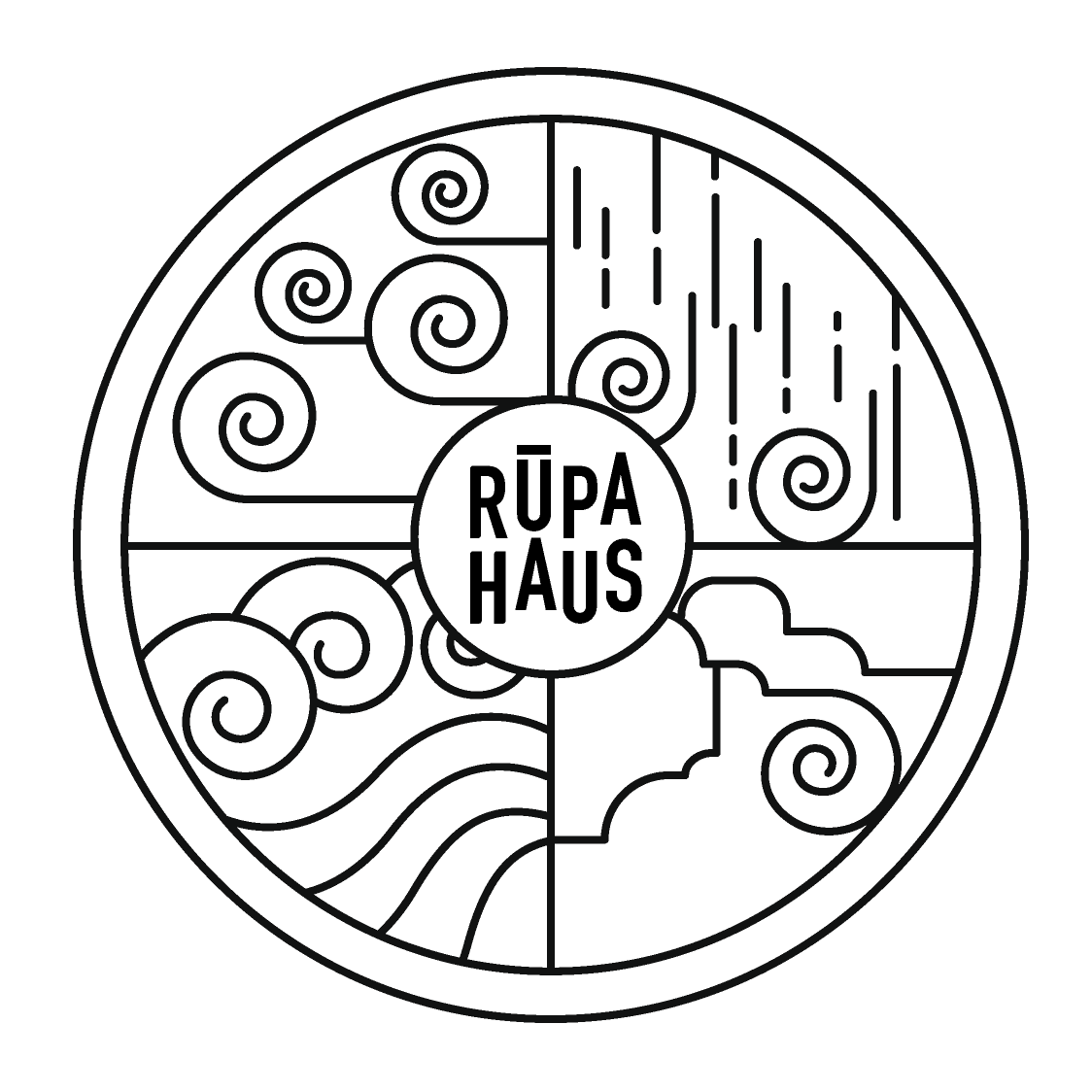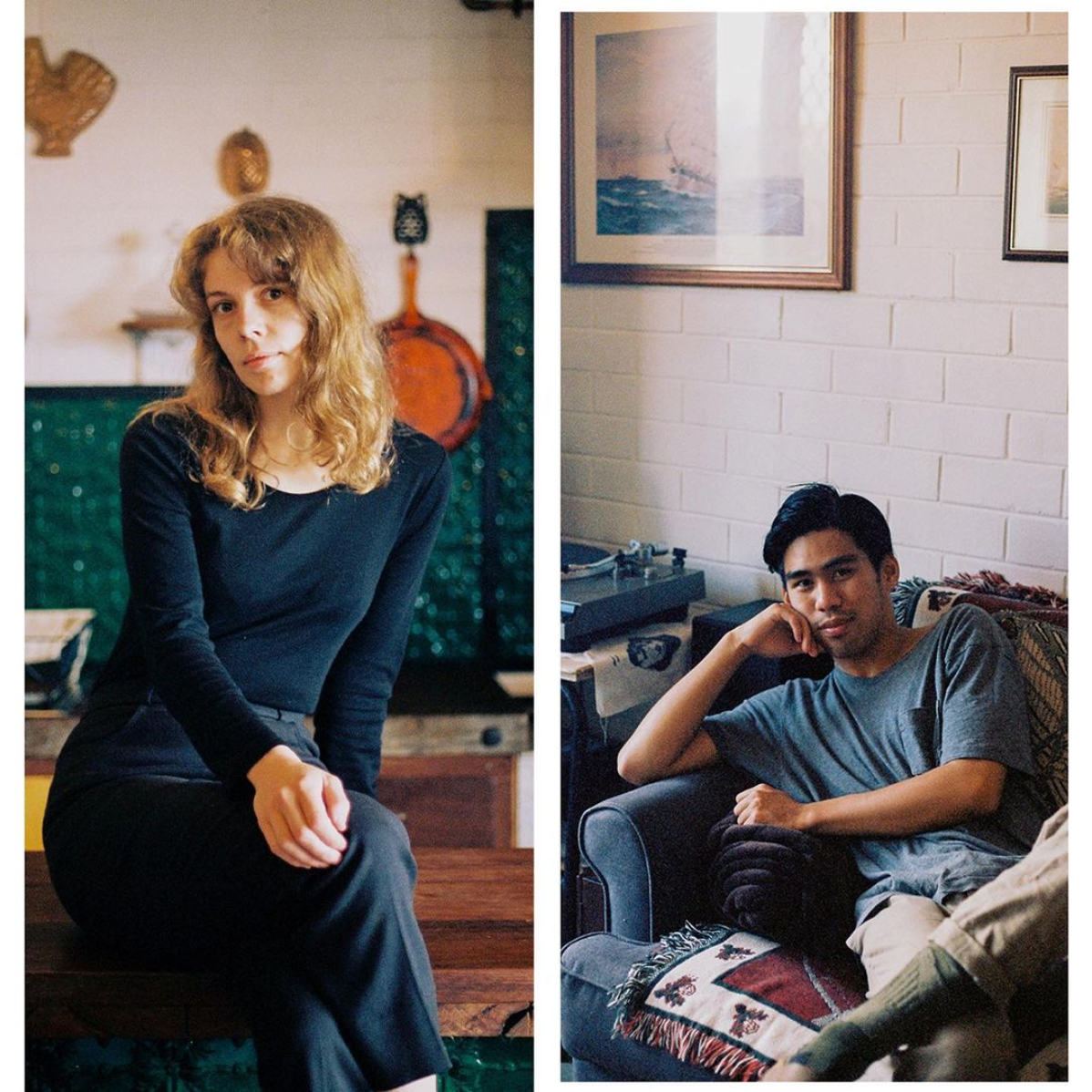Composed by Vivien Huynh / Images courtesy of The Road West
Two artists with an aptitude for selfless expression

 Something about that lazy wake on a Sunday.
Something about that lazy wake on a Sunday.
It comes with the gift of panic. The fleeting thought that opens the floodgates in the morning of the 7th day of the week that gets you to land your feet heavily on the side of your bed and ditch the slumber. For the last day of the weekend can’t be spent staring at the ceiling, dreading the Monday, can it?
It doesn’t seem to be this way for Cedric and Melody. From the moment we locked eyes across the cafe we’d agreed to meet at, there already was a ringing in our heads – a collective inkling – that although our eyes are seeing two people in an equal union, there was a stark difference to these two that made this union go together like bread and butter.
Caught in the surge of momentary adrenaline from evading the rain outside – as I entered the doors, I darted across to make my place and ease the awkwardness of that initial introduction. I then followed up with a question that in hindsight was rather silly when I asked: what’s good here?
“Matcha?” – Cedric is placid and forebodes a comical element to him that doesn’t show on plain sight upon first glance. We’re at a Matcha cafe, go figure.
“The matcha latte is good” – Melody adds onto Cedric’s harmless satire with a smile that would suggest Cedric enjoyed banter and that she enjoyed watching him do it.

 In for a treat? Or is this partnership no match for me on a Sunday? When sat in front of these two, the term free-spirited certainly comes to mind. We talk about unique qualities of each; the Asian diaspora in Mauritius based on Cedric’s chinese-mauritian background and the funny sound that ones collarbone makes by tapping on it. “She can make a cool noise with her clavicle” – Melody’s gaze remains fixated on Cedric every time he so much as leans forward or fills the crevices of his chair. This tells me that she appreciates his presence and she’s grown to find solace in his well-meaning words about her. “Down south when we were recording, Cedric said ‘Can I put a sound in the album?’ and we all had to make a sound, so that’s my sound. The sound producer turned it into a drum beat.”
In for a treat? Or is this partnership no match for me on a Sunday? When sat in front of these two, the term free-spirited certainly comes to mind. We talk about unique qualities of each; the Asian diaspora in Mauritius based on Cedric’s chinese-mauritian background and the funny sound that ones collarbone makes by tapping on it. “She can make a cool noise with her clavicle” – Melody’s gaze remains fixated on Cedric every time he so much as leans forward or fills the crevices of his chair. This tells me that she appreciates his presence and she’s grown to find solace in his well-meaning words about her. “Down south when we were recording, Cedric said ‘Can I put a sound in the album?’ and we all had to make a sound, so that’s my sound. The sound producer turned it into a drum beat.”
Cedric is amused by this quirky charm of hers.
“But to be fair, Cedric's sound is an armpit fart.”
Cedric is even more amused now. “I'm also a recovering alcoholic” – there’s that presumed sarcasm coming out – “Nah, I'm a photographer and filmmaker. I take photos and make videos for a living”
Is carefree the right word? If both their career paths aren’t telling enough – one a visual artist, and the other a writer – their choice to relieve the plights of what’s expected in order to walk their journey is no small feat. But the best part of getting to know these two is their ability to switch off the uncertainty of the future and work on what matters presently. Being present in their space and with things that are important far outweighs what lies ahead, and for Melody and Cedric, without fail, it’s manned the fort for quite some time now.
Around us, the chatter drowns out the distant drizzle on cement as we venture into more personal territory. Melody is pensive, partly because she wants to make sure her words match her emotions, “people think I’m collective and calm, but I’m a very emotional and up and down person.” We begin to sense the team effort at play here. She continues, “with Cedric, I'm my honest self, but I have a big filter for everyone else when it comes to the more negative emotions. I was raised to put others first all the time, so I never want to inconvenience someone else with my problems.” Melody collects her thoughts and turns towards Cedric – “it’s a source of conflict for us because Cedric likes to say we need to tell people if we’re not treated right, whereas I'm like, ‘No don't tell them anything, just let everything be’. But he's very much like ‘It needs to be said.’”
Normally, situations where two people are met with resistance in values, it comes bearing the essence of choice. The choice to show up. The choice to be present with someone and learn their tick, even if they’re different from yours. And the choice to understand how their perspective can alter your approach to life – especially when it means to live in the moment. “That’s something we both have as a guide. Yes you have to make decisions for the future, but you also only have now as the present and you need to make decisions that are good for your mental health too”, Melody shifts forward now, “you can think about what you want in the future and work towards that, but those things – unless you have them – they don't increase your value of living. It's what you do right now in your day-to-day, the small habits you create, and the lifestyle that you set up now that increase your standard of living and improve your mental health.”
As I’m listening intently to these clauses and sudden cue of realisations layering on top of one another, the fire within these two become noticeably widespread, like a flame being pushed and pulled in different directions. Much like how fire gets heftier from gushes of strong winds, we can see the rapidness of their thinking melding together. Cedric and Melody are a beautiful couple, but I remind myself that I can't get lost within the confinements of relationships only existing as one. Right here are two whole people who have lived experiences, whether shared or not. They are complete as individuals and this is why the magic happens. So I digress– “What gives each of you the courage to pursue your dreams?” Rather quickly I’m met with an answer, “It's important for me to be true to what I do and how I feel about what I do. It’s not a hard choice to sacrifice stability and financial security for flexibility and actually feeling good about my lifestyle.” At our core, we agree. But why does this lifestyle still feel uncharted? Cedric fills the blanks, “I mean, for me it’s an obvious and clear choice, but for other people it might not be like that. I certainly don't think my way is the good way or the right way– it's just my personal preference. I can't see any other thing for me.”

 Melody interjects to say that it’s not always pleasant and how not being a big risk-taker can have its disadvantages. “Cedric’s a risk-taker, so I feel he might have pursued this career on his own. I have a lot of self doubt and had I not gotten that support from him, I might not be doing this at all.” Cedric now shuffles slightly closer towards her. “The thought of working a 9 - 5 job in an office is what gives me the courage to create the life I want. Because that’s what makes me feel most alive and most engaged with the world.” Melody’s eyes now meet his, “ I also believe that being together gives us courage. It’s good to have that feedback from each other. And then there’s that feeling that we’re in this together. If we go through hard times or we can’t get work, we know we’re in it together. It gives me courage because we know we’re not out on our own, struggling.”
Melody interjects to say that it’s not always pleasant and how not being a big risk-taker can have its disadvantages. “Cedric’s a risk-taker, so I feel he might have pursued this career on his own. I have a lot of self doubt and had I not gotten that support from him, I might not be doing this at all.” Cedric now shuffles slightly closer towards her. “The thought of working a 9 - 5 job in an office is what gives me the courage to create the life I want. Because that’s what makes me feel most alive and most engaged with the world.” Melody’s eyes now meet his, “ I also believe that being together gives us courage. It’s good to have that feedback from each other. And then there’s that feeling that we’re in this together. If we go through hard times or we can’t get work, we know we’re in it together. It gives me courage because we know we’re not out on our own, struggling.”
Cedric weighs in, “–but I think a lot of people romanticise the idea of being an artist. The lifestyle and the risks involved can be too much for certain people. I'm not saying they don’t have the passion to make it or that they put in less effort, but for some people, instability– especially at the start – gives way to lots of self-doubt, self-criticism, and hurt feelings.” Being realistic is key, kids. “Art is about your expression of self. For some people, those negative impacts could potentially outweigh the positives of doing this. You have to pick and choose your battles. For me, I’m ok with having my feelings hurt over my work and I’m content with being a little bit unstable in certain areas of my life in order for me to be doing this. For me, doing this is more worth it than the negative aspects that come with it.”
Nothing is permanent, according to Cedric. “Find the things that matter to you the most and hold onto them – and everything else is just...what’s the word? Ephemeral?
“Like a vapour?”
Ephemeral was the word.
Having tinkered in a teaching degree at University before making the change, Cedric is well-versed in the discourse that surrounds giving up your education in place of taking up the arts – especially with first generation immigrant parents. Not concerned with the burden of ethnic expectations herself, Melody doesn’t seem to mind the role assigned to her of being the figure of moral support. “Your parents just want you to be safe and secure and stable. It’s something they didn’t have, so they want that for you. It came to a point where I had to have a few conversations with my parents about why I'm doing what I'm doing.” Cedric’s story isn't new to those who go through the diaspora of migrant families. When you abandon one life to build a better one for your children, it’s difficult to make sense of their decision to live on the edge of uncertainty. “One of my main motivators was to show my family that I could do it. I could be a photographer and filmmaker” – we’re now following the movements of his hands as this energy begins to circulate – “that it’s not just a hobby, it’s a very real thing I'm passionate about and that it’s sustainable for me to do this long term. I don't need a desk job that pays me 150k a year in order for me to be happy.” But how about those moments where it’s not the opinion of your family that matters, rather the harsh words of the public?

 “You can't control if people are going to care about your work or respond to it. That’s out of your control.” Something tells us that Melody is comfortable with the level of ambiguity that comes with their line of work. A silver lining between living responsibly and thriving off the changeable nature that is the course of life. We discuss our perceived importance of self in our work – who we are in our given timeline and whether it’s worth shaping how we see ourselves. The conversation takes a nosedive into the trap of self-importance, Melody reiterates how we have to remember that we’re just a tiny human in the speck of the universe. “I think you need to have both perspectives. You need to accept that your work might be significant to a small group of people in your life and that’s enough, or it may just be significant to yourself and the process of creating is the meaningful thing in your life.” The trick, we gathered, was to not take work too seriously. It’s about coming to terms with the concept that the work you put out may be insignificant to the rest of the world – that’s a part of the journey.
“You can't control if people are going to care about your work or respond to it. That’s out of your control.” Something tells us that Melody is comfortable with the level of ambiguity that comes with their line of work. A silver lining between living responsibly and thriving off the changeable nature that is the course of life. We discuss our perceived importance of self in our work – who we are in our given timeline and whether it’s worth shaping how we see ourselves. The conversation takes a nosedive into the trap of self-importance, Melody reiterates how we have to remember that we’re just a tiny human in the speck of the universe. “I think you need to have both perspectives. You need to accept that your work might be significant to a small group of people in your life and that’s enough, or it may just be significant to yourself and the process of creating is the meaningful thing in your life.” The trick, we gathered, was to not take work too seriously. It’s about coming to terms with the concept that the work you put out may be insignificant to the rest of the world – that’s a part of the journey.
“What I’m learning lately is that the focus of your dream can't be the end goal. You have to love the day-to-day grind of your craft and enjoy the process. What if you never reach the end goal? What if something came up and you had to give up your dream? You can’t have all your meaning wrapped in one thing because it can all be lost. You have to find meaning beyond just who you are in your work.”
To tie in the loose ends from the morning, I wanted to finish on an introspective note and asked both what kind of conversation they’d have with their younger selves if some time variant happened. If we could go head-to-toe with the 15 year old prepubescent, acne-prone versions of Cedric and Melody – to what would they grant as worldly advice?
“How old?”
“Let’s say, a moment in time where you felt lost.”
Both counterparts are now looking at each other – I’m humbled by their flair of ensuring that each person is heard. With a small gesture, Cedric motions for Melody to speak first.
“Don’t box your future self in because your current self thinks your future self should be a certain way. You’re always changing and growing, so just leave room for yourself and your partner to change and grow and surprise you.”
“How about you Cedric?”
“Because I know that life is going to change and it’s going to move, that excites me more than it stresses me out. The fact that I know that I’m not going to be doing this forever, makes me enjoy what I'm doing so much more. That’s why it’s always good to be intuitive and be introspective and try to understand where you are, where you want to go, and what you’re passionate about. The journey, for me, is a bit more exciting than the end goal.” He clears his throat and adds, “Never put things that actually matter to you, below the things that are trivial. My relationships with people is what matters to me. It’s always been an important aspect of my life. I’ll never put the technicalities of my work over treating people right. I see everybody as human. Well, I try to – some people are dogs. Like my brother, jokes.” We all laugh.
So, where to next?
As we finish the last drops of green in our cups, what was loud chatter in the background has now ceased to low whispers. I’ve been so present with these two that it has only occurred to me that the afternoon hour has arrived and everyone’s already making their way to their Sunday rituals. It was a pleasure to be carried away in the words spoken between all of us but now the question remains: where to next?
“I’m happy with wherever the wind takes us, but I’m also driven. I think it’s important to dream and say ‘what if?’ because that pushes you.”
“But you can’t play god.”
You’re right, Melody – you can’t. We think letting fate run its course sounds a whole lot cooler

Cedric and Melody Tang are the duo behind the Road West - a team that captures connections between people and celebrates places. This interview was a part of the production and release of our Collections at RŪPAHAUS.
At RŪPAHAUS, we believe in upholding our ideology of sustainability through ethical fashion choices and the relationships we build. Our In-Haūs Dialogues are a collusion of shared values with those who are passionate about sustainable clothing and the betterment of our planet.






Share:
Disconnect to Reconnect
In-Hāus Dialogue with the trio RŪPAHAUS sisters